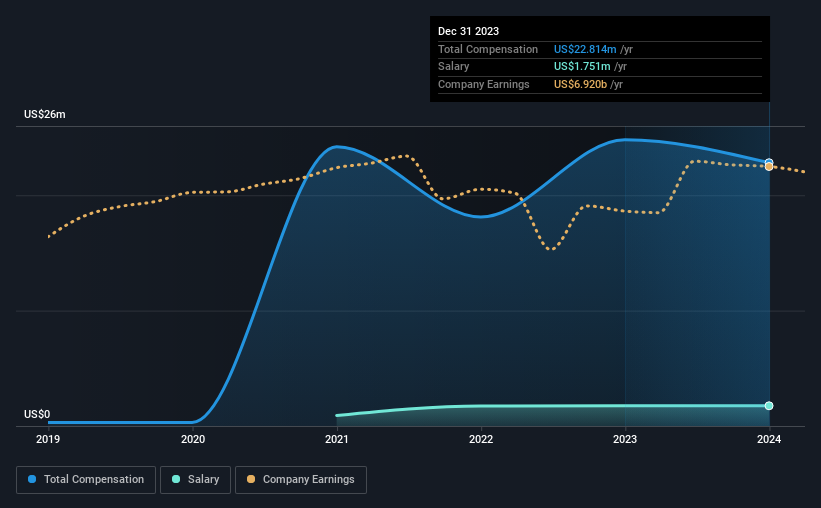Shareholders Will Probably Hold Off On Increasing Lockheed Martin Corporation's (NYSE:LMT) CEO Compensation For The Time Being
Key Insights
Lockheed Martin's Annual General Meeting to take place on 2nd of May
Salary of US$1.75m is part of CEO Jim Taiclet's total remuneration
The overall pay is 51% above the industry average
Lockheed Martin's EPS grew by 4.0% over the past three years while total shareholder return over the past three years was 33%
CEO Jim Taiclet has done a decent job of delivering relatively good performance at Lockheed Martin Corporation (NYSE:LMT) recently. This is something shareholders will keep in mind as they cast their votes on company resolutions such as executive remuneration in the upcoming AGM on 2nd of May. However, some shareholders may still be hesitant of being overly generous with CEO compensation.
View our latest analysis for Lockheed Martin
How Does Total Compensation For Jim Taiclet Compare With Other Companies In The Industry?
Our data indicates that Lockheed Martin Corporation has a market capitalization of US$112b, and total annual CEO compensation was reported as US$23m for the year to December 2023. We note that's a decrease of 8.0% compared to last year. We think total compensation is more important but our data shows that the CEO salary is lower, at US$1.8m.
For comparison, other companies in the American Aerospace & Defense industry with market capitalizations above US$8.0b, reported a median total CEO compensation of US$15m. Hence, we can conclude that Jim Taiclet is remunerated higher than the industry median. Furthermore, Jim Taiclet directly owns US$23m worth of shares in the company, implying that they are deeply invested in the company's success.
Component | 2023 | 2022 | Proportion (2023) |
Salary | US$1.8m | US$1.8m | 8% |
Other | US$21m | US$23m | 92% |
Total Compensation | US$23m | US$25m | 100% |
Speaking on an industry level, nearly 23% of total compensation represents salary, while the remainder of 77% is other remuneration. Lockheed Martin sets aside a smaller share of compensation for salary, in comparison to the overall industry. If non-salary compensation dominates total pay, it's an indicator that the executive's salary is tied to company performance.
Lockheed Martin Corporation's Growth
Over the past three years, Lockheed Martin Corporation has seen its earnings per share (EPS) grow by 4.0% per year. Its revenue is up 5.2% over the last year.
We'd prefer higher revenue growth, but it is good to see modest EPS growth. It's clear the performance has been quite decent, but it it falls short of outstanding,based on this information. Historical performance can sometimes be a good indicator on what's coming up next but if you want to peer into the company's future you might be interested in this free visualization of analyst forecasts.
Has Lockheed Martin Corporation Been A Good Investment?
Lockheed Martin Corporation has served shareholders reasonably well, with a total return of 33% over three years. But they would probably prefer not to see CEO compensation far in excess of the median.
To Conclude...
Given that the company's overall performance has been reasonable, the CEO remuneration policy might not be shareholders' central point of focus in the upcoming AGM. Still, not all shareholders might be in favor of a pay raise to the CEO, seeing that they are already being paid higher than the industry.
While it is important to pay attention to CEO remuneration, investors should also consider other elements of the business. That's why we did some digging and identified 2 warning signs for Lockheed Martin that you should be aware of before investing.
Arguably, business quality is much more important than CEO compensation levels. So check out this free list of interesting companies that have HIGH return on equity and low debt.
Have feedback on this article? Concerned about the content? Get in touch with us directly. Alternatively, email editorial-team (at) simplywallst.com.
This article by Simply Wall St is general in nature. We provide commentary based on historical data and analyst forecasts only using an unbiased methodology and our articles are not intended to be financial advice. It does not constitute a recommendation to buy or sell any stock, and does not take account of your objectives, or your financial situation. We aim to bring you long-term focused analysis driven by fundamental data. Note that our analysis may not factor in the latest price-sensitive company announcements or qualitative material. Simply Wall St has no position in any stocks mentioned.

 Yahoo Finance
Yahoo Finance 
